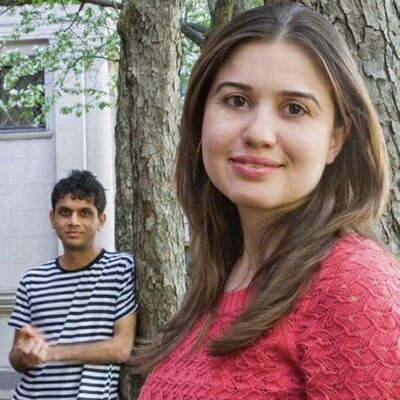News
Microsoft Research named two SEAS graduate computer science students as Research Fellows in 2008: Ece Semiha Kamar, advised by Barbara J. Grosz, Higgins Professor of Natural Sciences and Dean of the Radcliffe Institute, and Rohan Narayana Murty, advised by Matt Welsh, Associate Professor of Computer Science.
This marks the first time any Harvard student has been selected for the prestigious honor. Upon hearing the news, Margo Seltzer, Herchel Smith Professor of Computer Science, emailed, “Yesterday at a faculty meeting, several people were basking in the afterglow of having Microsoft award two of their 12 Ph.D. Fellowships to Harvard students. This is an incredible statistic: 1/6 of a prestigious fellowship being awarded to a tiny place like ours! This wonderful news coupled with the new Cambridge lab seems like an omen—we should shout this from the treetops."
Competition is especially fierce for the fellowships—and for good reason. Fellows receive support for two years—a stipend covering 100 percent of tuition and living expenses, a conference allowance, a salaried internship, and, of course, a Tablet PC loaded with the latest software. And then there’s that dinner with Bill Gates, at his home.
Murty, a voracious reader who tracks his literary progress online, grew up in Bangalore, India. After attending Cornell University as an undergraduate and spending his summers pursuing research at Caltech, he settled into SEAS to focus on designing multiagent decision systems.
While a passionate “academic at heart,” Murty has already interned twice with the Microsoft Research branch in India.
Kamar also crossed the ocean to pursue her Ph.D. She completed her undergraduate studies at the Faculty of Engineering and Natural Sciences of Sabanci University, Istanbul, Turkey. At SEAS she focuses on “how people make decisions—especially the problem of interruption management, or when a computer agent interrupts you by sending you a message or asking for your preferences.”
She wants to answer a seemingly simple question: When is the best time to butt in on a user? While practical, both Kamar and Murty’s research is forward-looking and moves at a decidedly academic pace. So why would a company facing competition from all sides in business moving at the speed of an instant message stop and smell the ivy?
Kamar says the organization, to borrow a friendly phrase from a competitor, thinks different. “Microsoft Research is really doing research, which is often surprising to outsiders. They publish a lot. Their measurement mechanism for how good they are is how much they publish,” she says.
Murty, in fact, authored part of what will become his thesis while interning at Microsoft Research. He says of the relationship, “It is helpful because when I am there I work on a very practical and immediate problem, and when I come back here, I work on an extension of that that sort of looks five to 10 years ahead. It lets a company experiment with an idea in an academic setting before they push ahead and test it in the marketplace.”
That such a balance works for both achieving profitable quarters and completing academic theses definitely seems worth, to modify Seltzer’s phrase, shouting from skyscrapers and ivory towers alike.
Cutting-edge science delivered direct to your inbox.
Join the Harvard SEAS mailing list.
